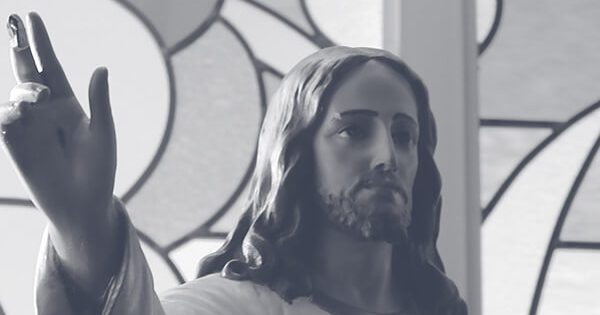Anyone who opens a gospel, will quickly discover that the central theme of Jesus’ teaching was this ‘kingdom of God’. In the gospel of Mark alone, which is usually considered the first of the gospels to be written, the expression appears 18 times, that’s more than one per chapter. It’s also the first thing on Jesus’ lips, according to this gospel: “After John the Baptist was put in prison, Jesus went into Galilee proclaiming the good news of God. ‘The time has come,’ he said, ‘the kingdom of God has come near.’”
According to the gospels the kingdom of God was a very big deal for the historical Jesus. But is it historical? Who’s to say the theme wasn’t invented later by people desperate to find in Jesus some ticket to heaven. Well for one thing, the expression ‘kingdom of God’ in the gospels sounds more like a political revolution that’s coming, rather than an ethereal place we go to when we die.
Later theological concerns about life after death don’t feature nearly as much as you might have thought in the teaching of Jesus. His concern seems to be more about evil being overthrown and justice being established here on earth. He spoke of the destruction of one order, and the renewal of all things, as it’s put in Matthew 19. In short, the kingdom of God is about the Almighty doing something about the mess in the world, and finally proving that He is the King over His creation. The historical question is where did this theme, the kingdom of God, come from if not from later concerns about going to heaven?
It’s fascinating that Christian leaders in the decades after Jesus, whose letters make up the bulk of the rest of the New Testament, only mention the kingdom of God in passing, it hardly appears. Those authors seem to assume the theme, but they hardly ever teach about it using that specific term. Now that suggests that the historical background to the theme of the kingdom of God is to be found earlier, in Jesus’ immediate Jewish setting. There’s no way it was a later retrojection into the gospels.
So the Old Testament, what the Jews call the Tanakh or Torah, occasionally does use an expression similar to ‘the kingdom of God’. In Isaiah 52, we hear about a herald who goes up a mountain with “good news” (the word is gospel), “that God will reign as King.” Now this is the verb form of the word ‘kingdom’, so it’s very close to ‘kingdom of God’. But other Jewish writings immediately after the Old Testament and before Jesus, do use the exact expression ‘kingdom of God’. So in the Dead Sea Scrolls we find a few important examples.
But we also find examples in a text written around the same time just a few decades before Jesus, it’s a text called the ‘Psalms of Solomon’. It’s not a Biblical text, it’s a series of nationalistic poems or songs written by Jewish leaders shortly before the life of Jesus, shortly after the year 63 (BC) when the Romans took control of Judea.
Lord, You are king forever,
For in You, O God, does our soul take pride.
We hope in God our saviour,
For the strength of our God is forever with mercy,
And the kingdom of our God is forever over the nations in judgment.
Lord, You chose David to be king over Israel,
And swore to him about his descendents forever,
That his kingdom should not fail before you.
See Lord, raise up for them their king, the son of David,
To rule over your servant Israel,
To destroy the unrighteous rulers,
To purge Jerusalem from Gentiles,
To drive out the sinners from the inheritance,
To smash the arrogance of sinners like a potter’s jar… (and on it goes)
A song like the one I’ve just quoted composed so close in time to Jesus gives us a good idea of how some people in the period thought about their predicament under the Romans, and how they envisaged the future. The key expression, ‘the kingdom of our God,’ has an immediate connection to Jesus’ own proclamation of the kingdom of God.
Regardless of later fixations about life after death and going to heaven, the teaching of Jesus about the coming kingdom was very much part of an earlier conversation in Judea and Galilee. About the problems of suffering and tyranny, and what God was going to do about it all. People in his day longed for the Almighty to step in and clean up the mess of the world. The language they used for this revolution was ‘the kingdom of God’.
Blessed is the poor in spirit for theirs is the kingdom (Matthew 5)
Blessed are the meek for they will inherit the earth (Matthew 5)
Blessed are those who are persecuted for righteousness for theirs is the kingdom (Matthew 5)
What shall we say the kingdom of God is like? Or what parable shall we use to describe it? It is like a mustard seed, which is the smallest of all seeds on earth (Mark 4)
Let the little children come to me and do not hinder them for the kingdom of God belongs to such as these (Mark 10)
It is easier for a camel to go through the eye of a needle than for someone who is rich to enter the kingdom of God (Mark 10)
On occasion Jesus even implied a reversal of the expectation that foreigners, like the Romans, would be wiped out by the coming kingdom. Following a really tender interaction with a Roman centurion, Jesus announced to his Israelite audience: “I say to you that many will come from the east and the west (that’s foreign lands), and will take their places at the feast with Abraham, Isaac, and Jacob in the kingdom of heaven. But the subjects of the kingdom (that’s the people of Israel) will be thrown outside.” (Matthew 8)
Jesus teaching about the kingdom of God not only fits with the broad hopes of his fellow Jews of the period. It also seems to challenge, deliberately confront, some aspects of those dreams. The kingdom of God, according to Jesus, was not the business of freedom fighters eager to crush their pagan overlords. In light of His call to love your enemies and turn the other cheek, he thought that violence on behalf of the kingdom actually ruled people out of that kingdom. For Jesus, the kingdom of God was for the meek, the little children, and for any who welcomed its arrival with humility.
By John Dickson
Kingdom of God
Want to hear the rest of the episode?
Check out episode 34: “World’s End”












































